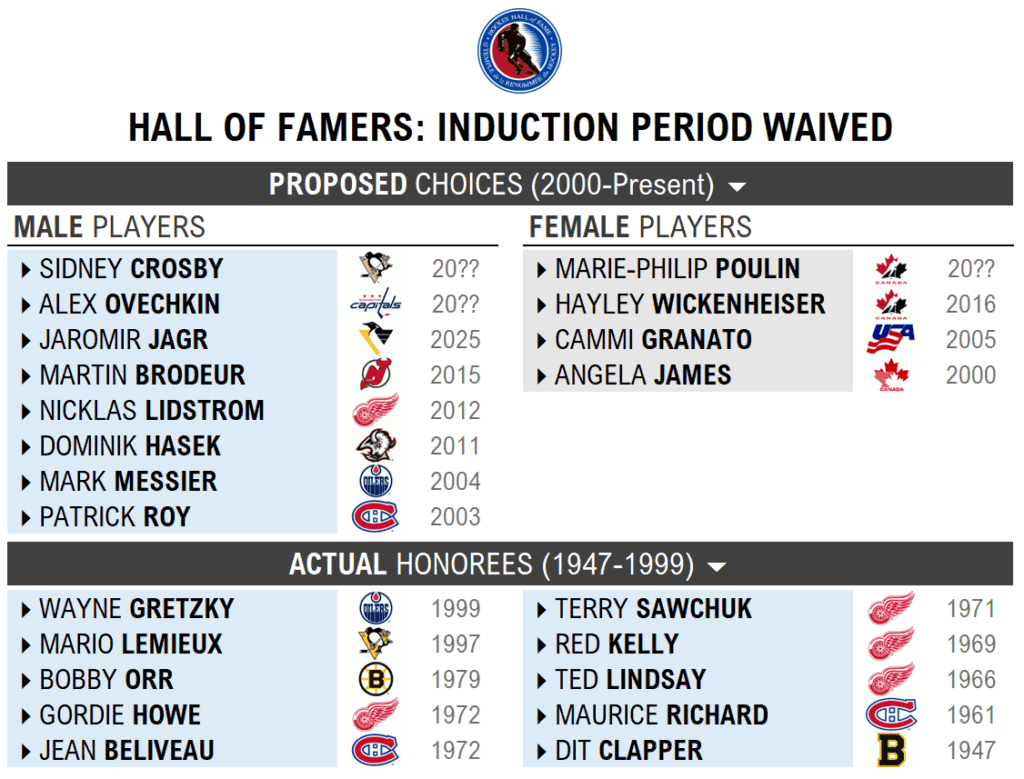Which superstars deserve to have their Hall of Fame waiting periods waived?

In April, 52-year-old living legend Jaromir Jagr claimed that this upcoming season would finally be his last. On Instagram last week, he doubled down on his retirement. After 37 seasons of professional hockey, the Czech superstar will call it quits.
Excited fans and media called for his three-season waiting period for the Hockey Hall of Fame to be waived. Jagr’s storied career warranted special treatment for direct entry as part of the Class of 2025, many argued.
The catch?
After the instant induction of Wayne Gretzky in 1999, the Hall amended its by-laws so that no player could be enshrined immediately. No special tier makes anyone more or less distinguished today. The only path to direct induction now is “by reason of grave or terminal illness or injury” — a button the Selection Committee fortunately hasn’t had to push yet.
Jagr is, of course, alive and well, even picking up a point in his first two games in Czechia’s top pro circuit. But while the Hall’s highest honor has been eliminated, it doesn’t keep us from weighing in on who from the last 25 years — and in the next 10 — is worthy of the distinction.
Background
In the Hall of Fame’s first 55 years through 1999, only 10 players skipped the line: Dit Clapper (1947); Rocket Richard (1961); Ted Lindsay (1966); Red Kelly (1969); Terry Sawchuk (1971); Jean Beliveau and Gordie Howe (1972); Bobby Orr (1979); Mario Lemieux (1997); and Gretzky.
That’s an average of one NHL player every five or six years, so those are our goal posts. 43 different players have been inducted in their first year of eligibility in the last quarter-century. But we’re focusing only on the most impactful and respected among those very best. Even slam dunk Hall of Famers like Jarome Iginla or Scott Niedermayer won’t be considered today.
So, which handful of modern icons since 2000 deserve the Hall of Fame fast track?
2001: Ray Bourque, Paul Coffey
Claim to Fame: Most (1,579) and second-most (1,531) points by defensemen in NHL history.
At the time of their retirements, only four other defensemen had reached 1,000 points. Yet, Bourque and Coffey surpassed 1,500. Of the pair, Bourque had the steadier career — impossibly, he finished top-seven in Norris voting in every one of his 22 seasons.
Waive the Wait?: No. A tough call to exclude Bourque. But neither star feels sufficiently revered.
2003: Patrick Roy
Claim to Fame: Retired with the most regular season (551) and playoff (151) wins in NHL history.
The only three-time Conn Smythe winner to date, Roy still has 38 more playoff wins than anyone else. His athleticism, swagger, and revolutionary use of the butterfly style reimagined goaltending.
Waive the Wait?: Yes. The most consistent big-game goalie and arguably the best to ever live.
2004: Mark Messier
Claim to Fame: Only player to captain two franchises to the Stanley Cup.
Messier peaked at a favorable time — in the highest-scoring era, on the highest-scoring team, with the highest-scoring player ever. Still, he won both an MVP and a Stanley Cup in two cities without Gretzky. He retired with six rings and the second-most regular season (1,887) and playoff (295) points.
Waive the Wait?: Yes. ‘Mess’ lives on the short list of sports’ greatest leaders.
2006: Steve Yzerman, Brett Hull
2009: Joe Sakic
Claim to Fame: Each retired top-eight in either career points (Sakic), goals (Hull), or both (Yzerman).
Waive the Wait?: No. That these three enduring superstars with such complete résumés get little consideration here shows the rarified air required.
2010: Chris Chelios
Claim to Fame: Retired with the most games played (1,651) by a defenseman.
Chelios’ influence as a groundbreaking American-born player is often overlooked. In fact, he has a strong case for the country’s G.O.A.T, achieved over one of the longest careers in sports history (26 seasons).
Waive the Wait?: No. If we made Bourque and Coffey wait, Chelios will have to join the line.
2011: Dominik Hasek
Claim to Fame: Only goaltender to win two Hart Trophies; six-time Vezina winner
Timing was not on Hasek’s side. Due to the Iron Curtain, his unorthodox style, and playing behind Ed Belfour, he didn’t get a full NHL season until he was 29 years old. Yet, Hasek won six Vezinas, two MVPs, two Pearsons, three Jennings, two Cups, and famously carried Czechia to Olympic gold in Nagano.
Waive the Wait?: Yes. On merit, he’s the most dominant goaltender ever. But more importantly, Hasek was the first European-trained starting goalie to win a Cup, a major influencer in conditioning, and elements of his playing style inspired a generation.
2012: Nicklas Lidstrom
Claim to Fame: First European to win the Norris, Conn Smythe, or captain a Cup winner.
While Lidstrom’s point totals pale in comparison to the high-scoring generation before him, his understated style changed hockey. A seven-time Norris winner, his positionally sound, poised, mistake-free brilliance remains the template for modern defensemen.
Waive the Wait?: Yes. An easy call.
2015: Martin Brodeur
Claim to Fame: Most games by a goalie (1,266), wins (691), and shutouts (124) in NHL history.
When he retired, Brodeur had an inconceivable 140 more wins than anyone. With modern goaltenders starting fewer games, the New Jersey fixture may hold his three famous records forever. A rule-changing puck handler.
Waive the Wait?: Yes. That’s three goalies in 12 years… but each is uniquely deserving.
2016: Hayley Wickenheiser
Claim to Fame: Widely considered the greatest female player of all-time.
A 23-year veteran of the Canadian national team, Wickenheiser still leads the program in points (379). A four-time Olympic gold medalist, she was the first woman to score a goal in a professional’s men league.
Waive the Wait?: Yes. ‘Wick’ remains the only first-ballot female inductee after Angela James and Cammi Granato — the Hall’s inaugural women in 2010. All three deserve to skip the wait.
2025: Jaromir Jagr
Claim to Fame: Longest pro hockey career ever; second-most points (1,921) in NHL history.
On his pro debut in Czechia in 1988, Sidney Crosby had just turned one. Jagr is still playing. While his feats of sustained excellence boggle the mind, Jagr’s McDavid-like peak featured five scoring titles.
Waive the Wait?: Yes. The Hall is made for players like Jagr.
Late 2020s: Sidney Crosby, Alex Ovechkin
Claim to Fame: Faces of the NHL and consensus best players of a generation.
Let’s not waste much time here. Crosby is among the best handful of players ever and tied Gretzky for most point-per-game seasons (19) last year. Ovechkin, the greatest goal scorer who ever lived, is now a safe bet to top Gretzky’s ‘unbreakable’ goals record of 894.
Waive the Wait?: Yes. Perhaps the easiest choices in 30 years.
Late 2020s: Marie-Philip Poulin, Hilary Knight
Claim to Fame: The best Canadian and American players of the current generation.
After a long and frustrating odyssey, the upstart PWHL has arrived. Would it have arrived as successfully and credibly without Poulin and Knight? Their games represents the modern template of evolution — powerful and highly-skilled.
Waive the Wait?: Yes and No, respectively. To take nothing away from Knight, it’s Poulin that’s widely considered the G.O.A.T. of the millennials — her three Olympic gold-winning goals seem like fiction.
Closing Thoughts
So, how’d we do?

From the NHL side, our list from 2000 through roughly 2035 includes eight players: Roy (2003); Messier (2004); Hasek (2011); Lidstrom (2012); Brodeur (2015); Jagr (2025); Crosby and Ovechkin (late 2020s).
That’s eight in 35 years. Why 35 years? The next most likely active candidate is Connor McDavid but his retirement should be about a decade away. We planned for an honoree every five or six years, but given the globalization of the sport this millennium, one every 4.4 years is reasonable.
On the women’s side, we’ve fast-tracked what might be its Mount Rushmore: James (2000); Granato (2005); Wickenheiser (2016); Poulin (late 2020s). Given there are still only 10 female Hall of Famers, four players from its formative 30 years of retirements preserves the feat as a special distinction.
So, while Hall of Fame waiting periods can’t be waived today, celebrating the game’s most iconic players is always in style. Whether McDavid, Auston Matthews, Cale Makar, Sarah Fillier, or someone else, fresh faces will continue to carry hockey’s inextinguishable torch.
Follow @AdjustedHockey on X; Data from Hockey-Reference.com and EliteProspects.com
Recently by Paul Pidutti
- Why Connor Bedard’s sophomore ceiling is much higher than you think
- High Noon 2024: Ranking the NHL’s 25 best goaltenders today
- High Noon 2024: Ranking the NHL’s 30 best defensemen today
- High Noon 2024: Ranking the NHL’s 50 best forwards today
- Matthews, McDavid, Makar and the fast track to hockey immortality
- Who’s the best candidate to break each franchise’s single-season (era-adjusted) points record?
- Most long-term UFA signings turn out even worse than you think
- McDavid vs. Crosby: Which generational talent had the better career by 27?
More from Paul Pidutti
- Generational Talent Watch: Schaefer, Celebrini, Bedard and Carlsson producing at historic levels
- Father Time 2025: Are McDavid, Binnington and others on the decline?
- Surprise: great players rarely make great NHL coaches
- Overtime, loser points unleashing chaos in NHL’s Season of Parity
- Projecting the 2026 Hall of Fame Class: Bergeron, Price and endless possibilities